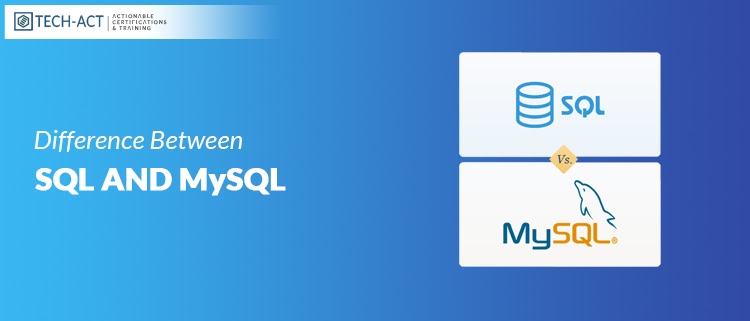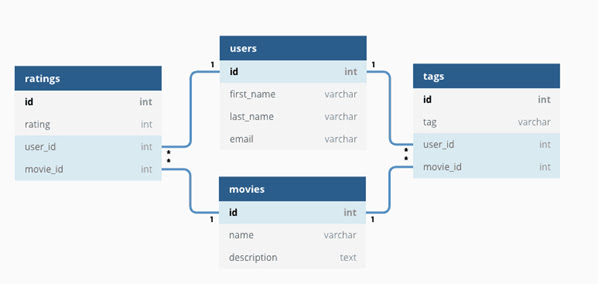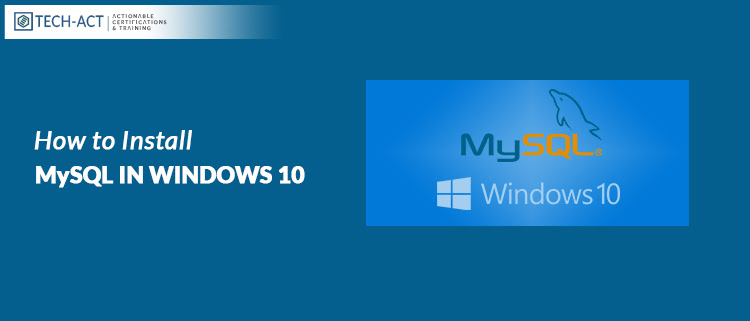Difference Between SQL And MySQL

Today, most of the organizations irrespective of their size have their presence on virtual platform which has eventually increased the importance of databases. So what is a database? A database is a collection of data which is organized and stored in an electronic form with an intension to manage the business data efficiently. Databases are very crucial for any businesses as it helps in storing the data in a centralized manner. Databases also assist in communicating the critical business information like customer profile, employee profit, product inventory, sales transactions, marketing campaigns etc. It also secures the data from the hacker by setting up different authentication mechanisms like user logins and access specifiers.
Today, in this blog we are going to take a look at relational databases with a specific focus on popular data management tools i.e. SQL & MySQL and will also see how they are distinct from each other.
RELATIONAL DATABASE
The database type which stores a collection of data that has pre-defined relationships is known as relational database. Relational database follows relational model and it represents the data as a set of tables which has columns and rows. Every column within a table contains a particular data and a field which stores and attribute’s real value. Every row has a very exclusive identifier which is known as primary key. The stored data can be accessed even without reorganizing the tables. Strict integrity rules are followed by relational databases to make sure that the data which is stored in the tables is always authentic and within the reach. For example, an integrity rule which states that duplication of rows is not allowed in a table. In this way, we can eliminate the chances of having duplicate data which will reduce the errors in the table.

SQL and MySQL are two terms which are used at a large scale in enterprise data management. They might seem similar but they aren’t. You would be able to work with relational databases, big data, business intelligence, and business analytics, only when you understand the difference between SQL and MySQL.
SQL : STRUCTURED QUERY LANGUAGE
SQL stands for Structured Query Language. It is used for the communication purpose with the Database. SQL is a standard language which is used for performing tasks like retrieval, updation, insertion and deletion of data from a database. If you want to make any changes to databases then you can use SQL to write programs. It is also used to create and modify database schemas. The biggest benefit provide by SQL is that a single command can be used for gaining access to multiple records within a database.
MYSQL
MySQL was developed way back in 1995 by MySQL AB. Today, it is owned and offered by Oracle Corporation. MySQL is one of the most popular open-source database management systems. It is easy to use, reliable, and fast. MySQL is a database management system that works on embedded systems as well as client-server systems. It can be written in the C and C++ programming languages. It is compatible with Windows, Mac OS X, Linux, and Unix-based operating systems. MySQL is a core element of the open-source technology stack, LAMP (Linux, Apache, MySQL, and PHP). It offers a multi-user access to databases.
What is the difference between SQL AND MySQL
Here, we begin….
| SQL | MySQL |
|
|
|
|
|
|
|
|
|
|
|
|
|
|
|
|
|
|
|
|
|
|
Difference between MySQL and SQL Server
| SQL Server | MySQL Server |
|
|
|
|
Conclusion
In the end I would conclude by saying that the debate of SQL VS MySQL is a never ending one and none alone can win it because despite of the differences between SQL and MySQL, they very well complement each other which can meet one’s relational database requirements. Also whether you choose SQL or MySQL, it completely depends upon your specific requirements relating to security, speed, scalability, and efficiency.
All the best!!!
Today, most of the organizations irrespective of their size have their presence on virtual platform which has eventually increased the importance of databases. So what is a database? A database is a collection of data which is organized and stored in an electronic form with an intension to manage the business data efficiently. Databases are very crucial for any businesses as it helps in storing the data in a centralized manner. Databases also assist in communicating the critical business information like customer profile, employee profit, product inventory, sales transactions, marketing campaigns etc. It also secures the data from the hacker by setting up different authentication mechanisms like user logins and access specifiers.
Today, in this blog we are going to take a look at relational databases with a specific focus on popular data management tools i.e. SQL & MySQL and will also see how they are distinct from each other.
RELATIONAL DATABASE
The database type which stores a collection of data that has pre-defined relationships is known as relational database. Relational database follows relational model and it represents the data as a set of tables which has columns and rows. Every column within a table contains a particular data and a field which stores and attribute’s real value. Every row has a very exclusive identifier which is known as primary key. The stored data can be accessed even without reorganizing the tables. Strict integrity rules are followed by relational databases to make sure that the data which is stored in the tables is always authentic and within the reach. For example, an integrity rule which states that duplication of rows is not allowed in a table. In this way, we can eliminate the chances of having duplicate data which will reduce the errors in the table.

SQL and MySQL are two terms which are used at a large scale in enterprise data management. They might seem similar but they aren’t. You would be able to work with relational databases, big data, business intelligence, and business analytics, only when you understand the difference between SQL and MySQL.
SQL : STRUCTURED QUERY LANGUAGE
SQL stands for Structured Query Language. It is used for the communication purpose with the Database. SQL is a standard language which is used for performing tasks like retrieval, updation, insertion and deletion of data from a database. If you want to make any changes to databases then you can use SQL to write programs. It is also used to create and modify database schemas. The biggest benefit provide by SQL is that a single command can be used for gaining access to multiple records within a database.
MYSQL
MySQL was developed way back in 1995 by MySQL AB. Today, it is owned and offered by Oracle Corporation. MySQL is one of the most popular open-source database management systems. It is easy to use, reliable, and fast. MySQL is a database management system that works on embedded systems as well as client-server systems. It can be written in the C and C++ programming languages. It is compatible with Windows, Mac OS X, Linux, and Unix-based operating systems. MySQL is a core element of the open-source technology stack, LAMP (Linux, Apache, MySQL, and PHP). It offers a multi-user access to databases.
What is the difference between SQL AND MySQL
Here, we begin….
| SQL | MySQL |
|
|
|
|
|
|
|
|
|
|
|
|
|
|
|
|
|
|
|
|
|
|
Difference between MySQL and SQL Server
| SQL Server | MySQL Server |
|
|
|
|
Conclusion
In the end I would conclude by saying that the debate of SQL VS MySQL is a never ending one and none alone can win it because despite of the differences between SQL and MySQL, they very well complement each other which can meet one’s relational database requirements. Also whether you choose SQL or MySQL, it completely depends upon your specific requirements relating to security, speed, scalability, and efficiency.
All the best!!!



























